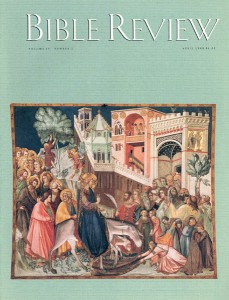Is It Possible to Understand the Book of Job?
A sensitive new reading of one of the most puzzling and powerful books in the Bible

The book of Job, one of the world’s greatest literary works, is better known for the problems it poses and the issues it spawns than for its answers and resolutions.
While to the untutored eye, Job (at least in translation) reads smoothly from the beginning to end and exhibits cohesion amid diversities, more critical investigation uncovers seams in the fabric if not rents. There are rough passages and rougher transitions. A good case can be made that various segments are intrusive and were not part of the original work. Other questions have been raised about the sequence of speeches and their integrity and completeness.
Nevertheless, we must also respect the final editor or compiler of the book. It is not an accidental assemblage of disparate and disconnected materials. Whatever the ultimate origin of the several parts, they have been worked into a whole, and if seams and gaps are still visible, then Job is hardly different from other great works of literature and art. It is reasonable and legitimate to deal with the book as a whole.
Already a library member? Log in here.
Institution user? Log in with your IP address.

